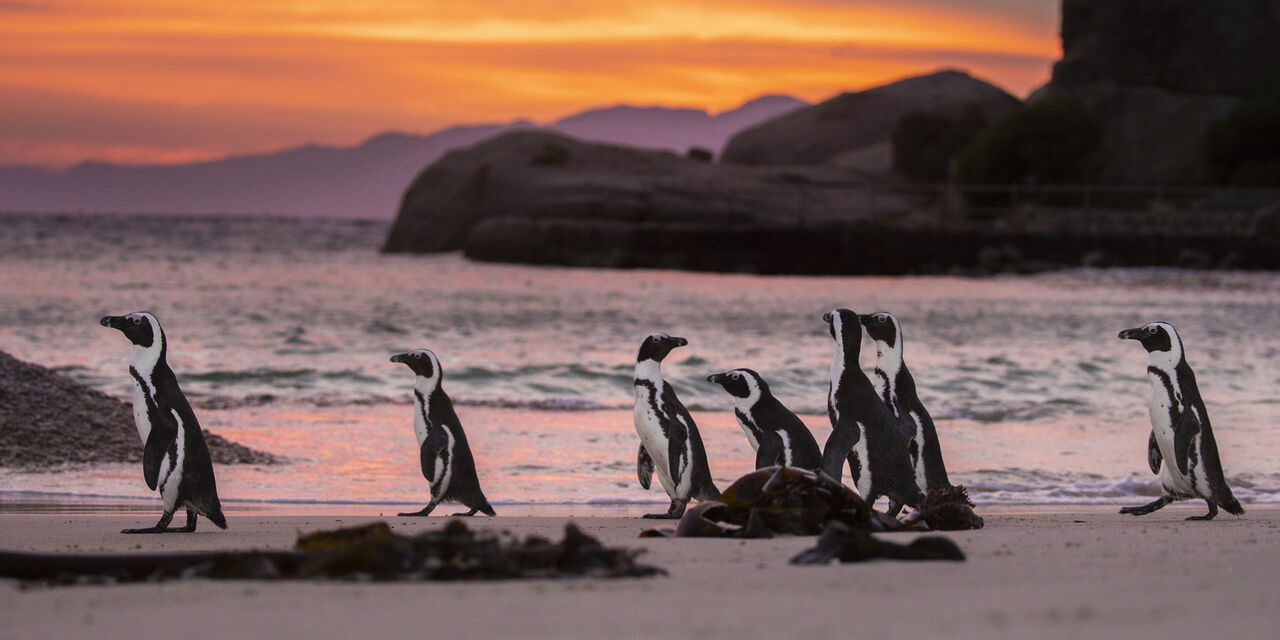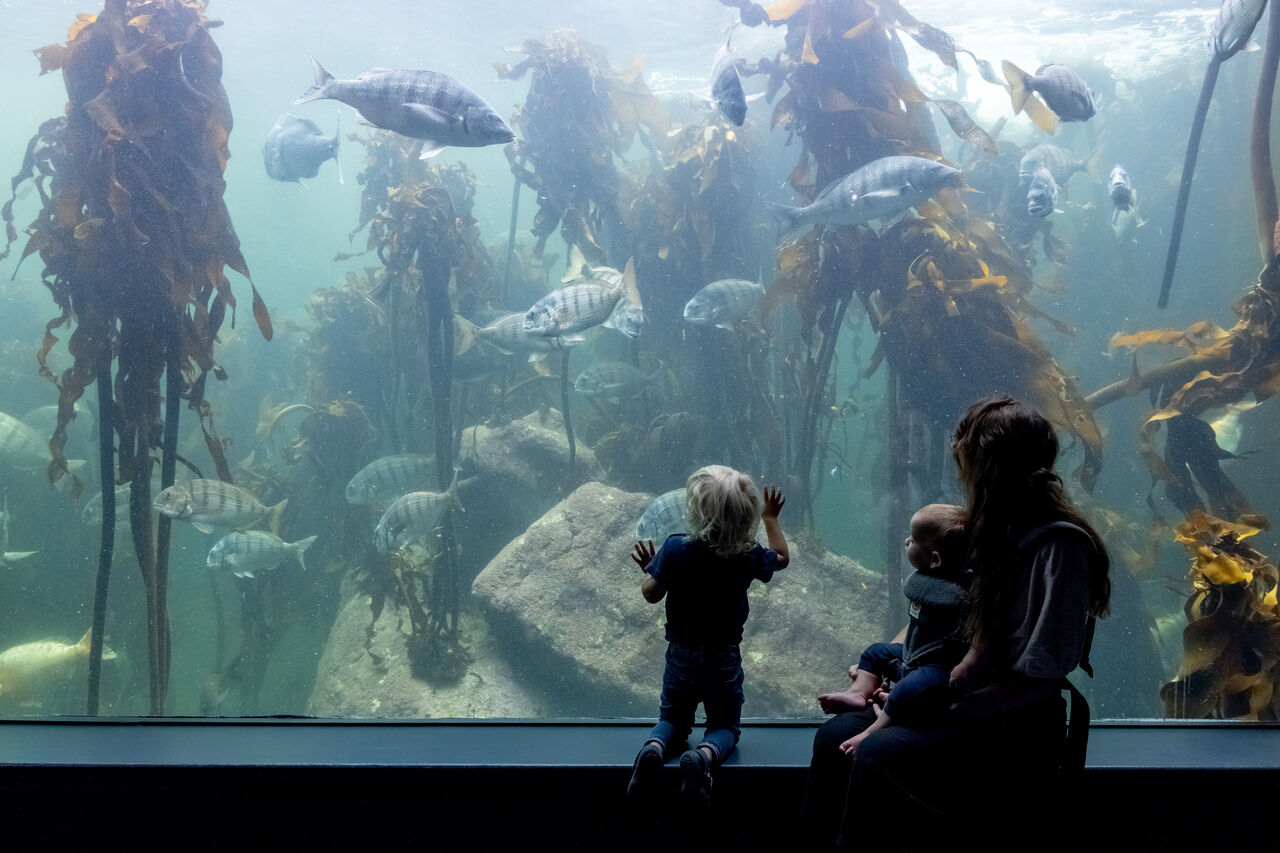
Biodiversity crisis: Our position statement
The Two Oceans Aquarium and Foundation are uniquely positioned to achieve impact through the significant number of people we reach, and this impact is further amplified by our location in the V&A Waterfront.
Our position statement on the biodiversity crisis will guide our actions in response to the four major threats to the ocean and will support our efforts to galvanise individual, interpersonal, community, organisational action or support for multistakeholder processes and policy change.
Why we are taking action
Problem statement
“The natural world is changing. And we are totally dependent on that world. It provides our food, water and air. It is the most precious thing we have, and we need to defend it,” Sir David Attenborough.
Biodiversity on land and underwater is under serious threat as a result of human activities. According to the WWF Living Planet Report 2024, “Over the past 50 years (1970–2020), the average size of monitored wildlife populations has shrunk by 73%, as measured by the Living Planet Index (LPI). This is based on almost 35,000 population trends and 5,495 species of amphibians, birds, fish, mammals and reptiles. Freshwater populations have suffered the heaviest declines, falling by 85%, followed by terrestrial (69%) and marine populations (56%).”
Southern Africa is home to an incredibly rich diversity of both terrestrial and aquatic species, many of which are endemic to this region. South Africa is the third-most biologically diverse country in the world. Even though it occupies less than 1% of the world’s terrestrial land area, South Africa is home to an astonishing array of organisms, including some 7% of the world’s plants, 4% of the world’s reptiles, 7% of the world’s birds, 5% of the world’s mammals, 2% of amphibians, 1% of freshwater fish, and about 16% of all known coastal marine species.
In terms of the marine environment, over 12 914 known marine species occur off the coast of Southern Africa, and this number is increasing annually as more species are discovered. About a third of these species are endemic, making this one of the richest marine biodiversity regions in the world. We have almost 10% of the world’s coral species, 25% of all known cephalopod species (octopus, squid, cuttlefish), 16% of shark, skate, and ray species, and 13% of fish are endemic to this region.
South Africa’s incredible biodiversity attracts millions of tourists from around the world, which creates jobs for thousands of people. According to Stats SA, “In 2019, biodiversity-based tourism’s direct gross domestic product (GDP) was R27 726 million (or R27,7 billion), driving 13,3% of economic activity within the broader tourism sector". In other words, for every R100 generated by the tourism sector, R13.30 was biodiversity-based…Biodiversity-based tourism accounted for 11,8% of jobs in the tourism sector in 2019.
South Africa cannot escape the negative impacts of human activity. According to the 2018 National Biodiversity Assessment Report, 64 of 136 (47%) marine and coastal habitat types are threatened, with 17% of all habitat types critically endangered, 7% endangered, and 23% vulnerable. Fishing is the greatest pressure on marine biodiversity, while coastal development is the greatest pressure on coastal biodiversity. Other threats include freshwater flow reduction, alien and invasive species, pollution, and climate change.
The South African Constitution states that everyone has the right:
- To an environment that is not harmful to their health or well-being; and
- To have the environment protected, for the benefit of present and future generations, through reasonable legislative and other measures that—
- Prevent pollution and ecological degradation,
- Promote conservation, and
- Secure ecologically sustainable development and use of natural resources while promoting justifiable economic and social development.
Two Oceans Aquarium and Foundation position statement
Species, habitats, and ecosystems across the planet are under severe pressure from human development and overexploitation. Species are going extinct at an increasing rate and we are heading towards ecological collapse, putting ourselves and the planet at risk. It is imperative that we conserve the biodiversity on the planet for people and for nature.
“Biodiversity and human rights are closely interlinked. Without healthy, functioning ecosystems, which depend on healthy biodiversity, there would be no clean air to breathe, safe water to drink or nutritious food to eat. The loss of biodiversity has severe consequences for human well-being and human rights”.
Biodiversity is a right for all.
What we are doing
We are driven to inform and inspire people about the ocean and the life it supports. We inspire new ways of thinking to enable an appreciation of the links between human behaviour and the wellbeing of the ocean, provide practical actions to lighten our footprint, play an active role in the conservation of key marine species, and lead by example.
We strive to motivate people to take action on behalf of the ocean. The Two Oceans Aquarium connects people to the ocean through its myriad displays, which showcase the rich diversity of marine species. The Aquarium inspires awe and awakens its visitors to this underwater world through live displays, presentations, experiences, interactive exhibits and via other media platforms. Our Foundation educates and nurtures future conservation-minded leaders through world-renowned courses both online and onsite, and through educational outreach programmes. Our scientifically and socially sound conservation and research programmes and campaigns contribute to inspiring and building an active ocean community to protect our oceans.

Conservation and animal welfare projects include the rescue, rehabilitation, tagging and release of endangered sea turtles; the seal disentanglement and rescue programme; sunfish rescue and DNA sampling; and shark research. We work closely with the Southern African Foundation for the Conservation of Coastal Birds (SANCCOB) in their efforts to rescue, rehabilitate and release endangered African penguins and other seabirds. Our Foundation coordinates the Marine Wildlife Management Programme on behalf of the V&A Waterfront and monitors wildlife in and around the Waterfront and Table Bay harbour.
- We focus on two key campaigns to protect against biodiversity loss: The African penguin Not On Our Watch campaign and Marine Protected Areas Day (MPA Day).
- We are guided by peer-reviewed scientific evidence and community/indigenous ways of knowing.
- We measure, evaluate and research the efficacy of our approaches.
References
- https://wwflpr.awsassets.panda.org/downloads/2024-living-planet-report-a-system-in-peril.pdf
- United Nations Environment Programme (2024). For all life on Earth: Actions to protect, restore and sustainably use nature. A practical guide in support of the Kumming-Montreal Global Biodiversity Framework. https://wedocs.unep.org/20.500.11822/46647